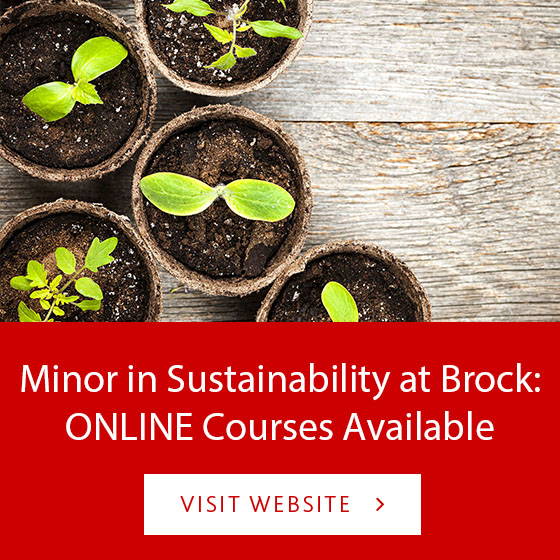Blog Contributor: Erica Harper

On Thursday, January 21st, The Environmental Sustainability Research Centre’s (ESRC) Sustainability Seminar Series continued with a panel discussion on exploring careers in the field of sustainability.
The panelists included Kara Renaud from Career Education at Brock as well as Brock Master of Sustainability alumni Leaya Amey, Kelsey Scarfone, and Nicholas Fischer. To learn more about each panelist, click here to read their biographies.
The panelists discussed important topics for prospective, current, and past SSAS students that will undoubtably help them in their journeys from being in the program to navigating through the challenging times between graduation and landing a job in sustainability. Each panelist provided the audience with their varying experiences and what they learned as they reflected on the paths they took to get to where they are today in the corporate world, the public sector, and the non-profit space.
As a someone who recently completed the Master of Sustainability program at Brock in Fall 2020, here are my key takeaways and pieces of advice based on what I learned from all the panelists:
Patience and flexibility are essential:
Being patient with yourself and flexible while you’re navigating life from graduate school to the working world was a piece of advice that all of us could use. All the panelists agreed that we must be patient as we determine what we want to do within the field of sustainability since there are a wide variety of options, and to be flexible with your timelines. It’s fun to plan out your post-graduation life while you’re in school, but you never know what can happen (like a global pandemic) so it’s best to remain flexible regarding the type of work you get into and when you start working after graduation. As long as you’re honing your skills, volunteering, networking, or getting involved in some way, you will eventually find a job that works for you.
Communication and collaboration are key:
Effective communication is essential in all jobs, but it is especially important in the field of sustainability. From CSR reporting to policy analysis, it’s crucial to know how to formulate an effective and impactful message to be able to enact change within an organization, the public, or the government, to name a few. Collaboration, which is a skill most students will quickly learn throughout the program’s group projects, is a skill that cannot be overlooked. Since sustainability is directly tied to the environment, the economy, health, and social issues, there is no doubt that sustainability professionals will need to collaborate with people in different departments on a daily basis. Due to the transdisciplinary nature of the SSAS program and the field of sustainability in general, students must prioritize gaining collaboration skills to help them be competitive in the job market.
Push yourself out of your comfort zone:
The panelists agreed that putting yourself out there and attending conferences, networking events, and reaching out to professionals in your field on LinkedIn will directly contribute to landing a job in your desired field. It’s important to note that you may not start your career off in the field of sustainability, but you may work for a company that has a sustainability department that you may have the chance to work with or even transfer to once you gain more experience. Ultimately, making one connection leads to that connection knowing someone who knows someone who may have the perfect job for you! It’s all about continuing to meet people (virtually) who can provide you with more information in the field that you hope to work in, which will help you gain a deeper understanding of trends, important skills, and the direction of an industry you may be interested in.
If you missed the live panel discussion, make sure to check it out on the ESRC’s YouTube channel here.
